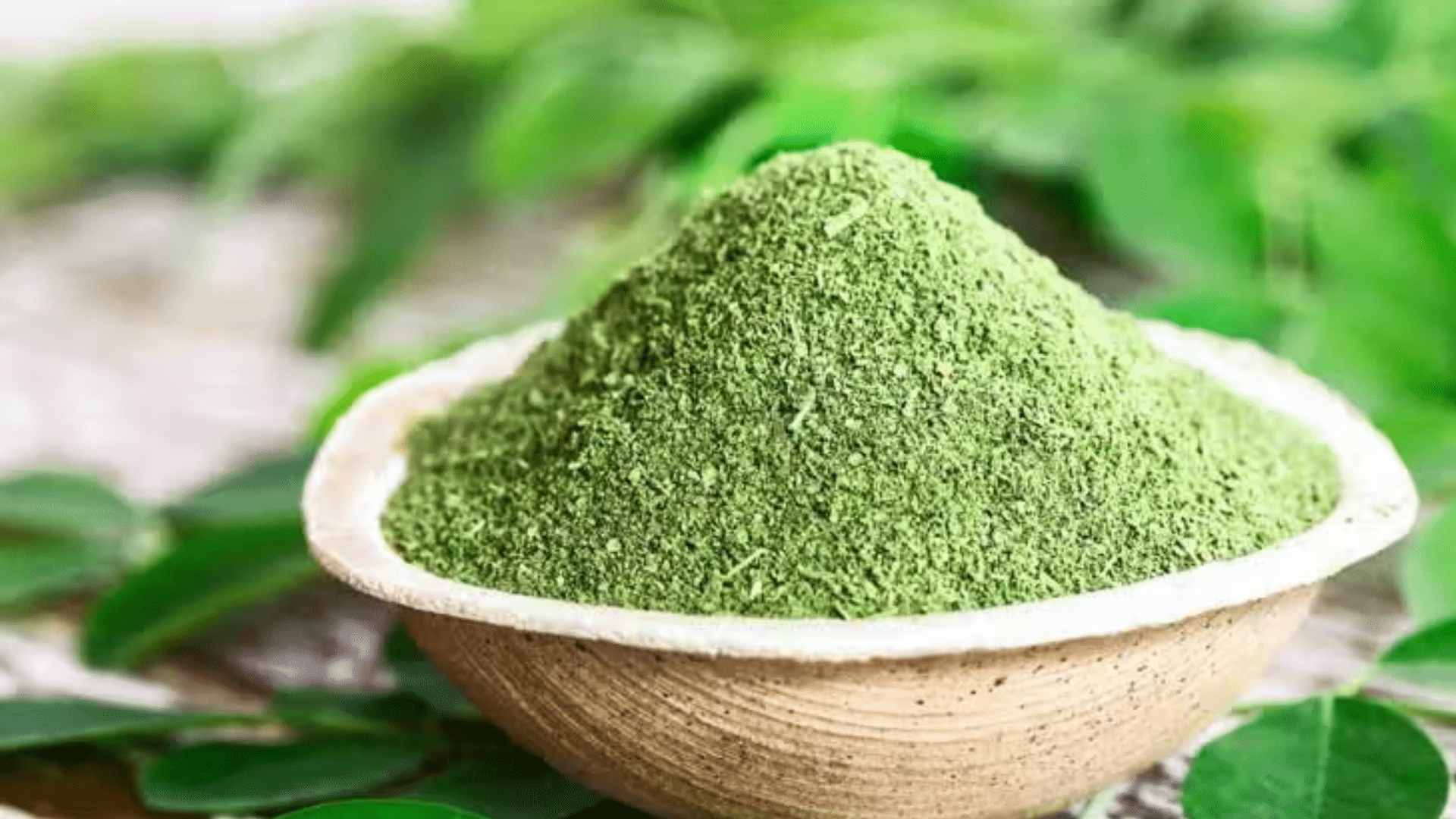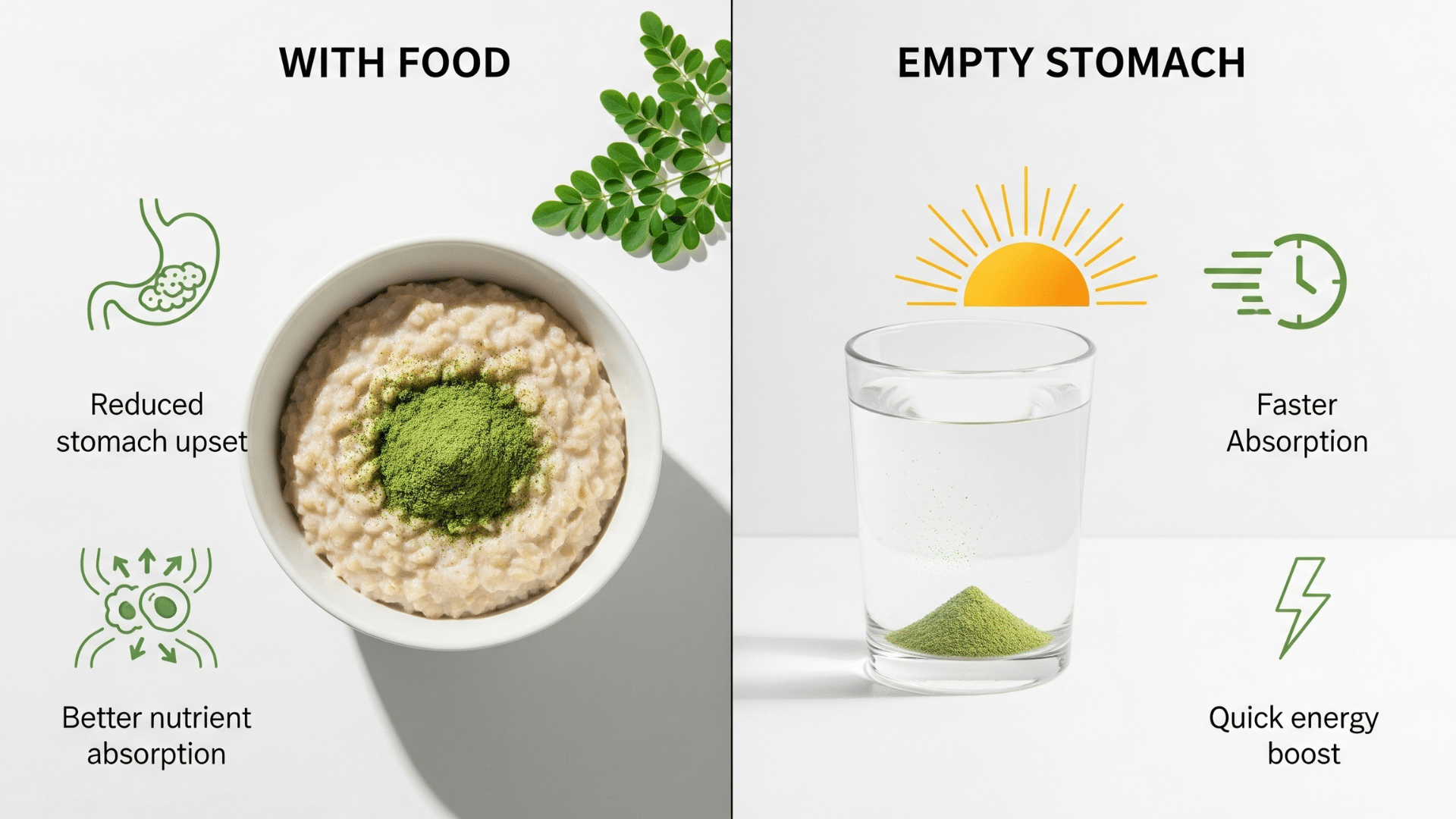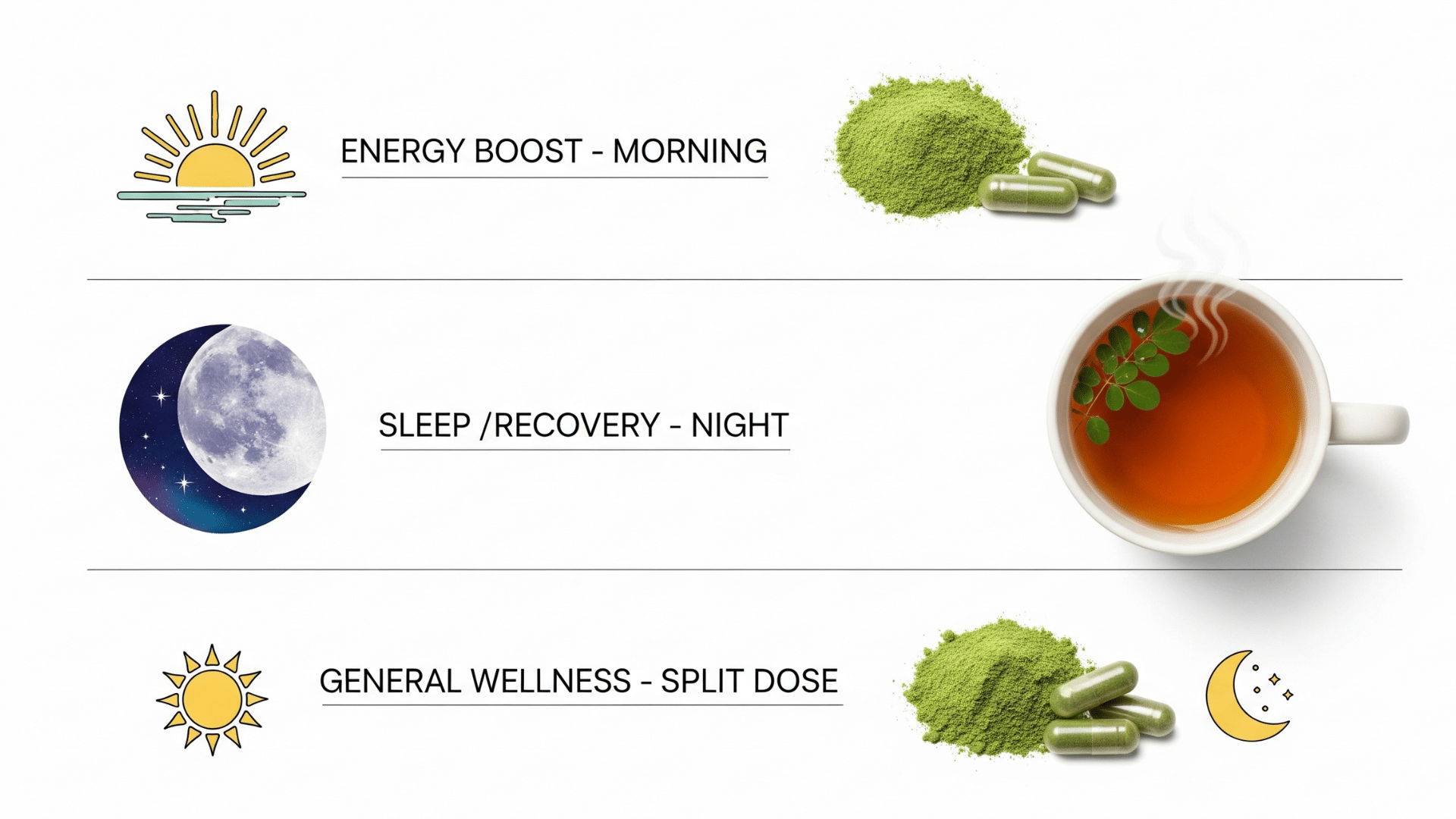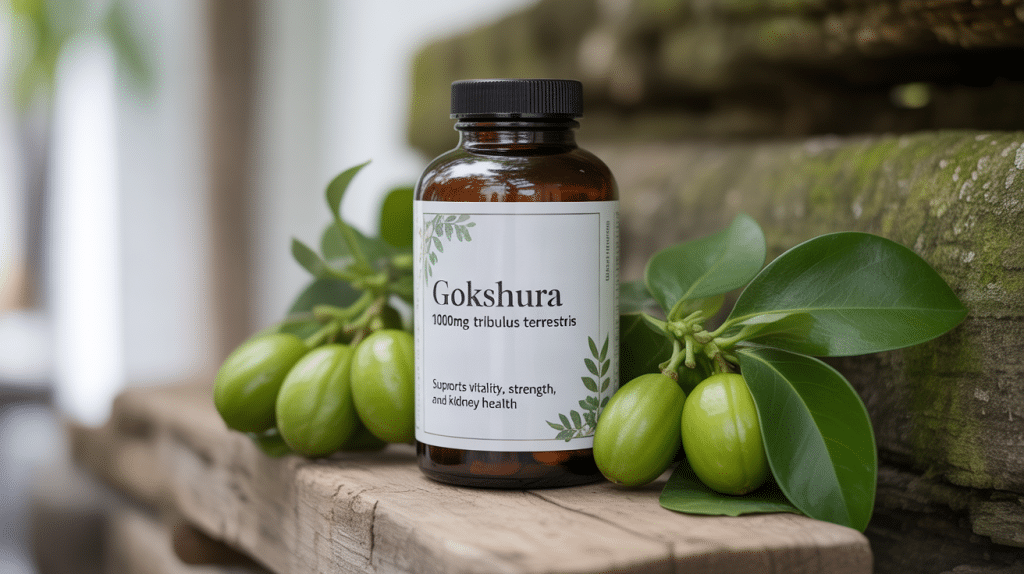If you’ve been wondering, should I take moringa in the morning or at night? The answer depends on your health goals and daily routine. Some people enjoy the steady energy it gives in the morning, while others prefer its calming effect at night.
Moringa’s nutrients can work in different ways depending on when you take it, so timing can make a real difference in how you feel.
Understanding those differences helps you choose the approach that supports your health and fits seamlessly into your lifestyle.
Getting to Know Moringa
Moringa, often called the “drumstick tree” or “miracle tree,” is a nutrient-rich plant valued for its leaves, seeds, and pods. Native to parts of Asia and Africa, it’s packed with vitamins, minerals, protein, and antioxidants.
People use it for its potential to boost energy, support immunity, aid digestion, and promote overall wellness. Moringa can be consumed as powder, capsules, tea, or fresh leaves, making it easy to include in daily routines.
While widely regarded as safe, it’s important to follow recommended dosages and be aware of possible interactions with certain medications or health conditions.
Overall Health Benefits of Moringa
Moringa offers a wide range of nutrients and natural compounds that can support many areas of your health and wellness.
1. Rich Nutrient Source
Moringa leaves are loaded with vitamins A, C, and E, along with calcium, potassium, and protein. This nutrient-dense profile supports bone health, skin vitality, and overall energy.
Because it’s plant-based, Moringa is also a valuable source of nutrition for those following vegetarian or vegan diets, making it an easy way to help fill common dietary gaps.
2. Antioxidant & Anti-inflammatory Support
Moringa contains antioxidants like quercetin and chlorogenic acid that help protect your cells from free radical damage. These compounds may also reduce inflammation, which is linked to many chronic health issues.
Regular intake of Moringa can support joint comfort, aid recovery after physical activity, and help maintain overall cellular health over time.
3. Immune System Boost
The vitamins, minerals, and amino acids in Moringa can help strengthen your body’s natural defenses. Vitamin C supports immune cell function, while iron promotes healthy oxygen transport.
By regularly including Moringa in your diet, you may improve your ability to fight off everyday illnesses and maintain resilience against seasonal health challenges.
4. Blood Sugar & Cholesterol Management
Studies suggest Moringa may help maintain healthy blood sugar and cholesterol levels. Compounds in the leaves can slow sugar absorption and support healthy lipid profiles.
These effects can be beneficial for people aiming to manage weight, reduce cardiovascular risks, and support balanced energy levels throughout the day.
Should I Take Moringa in the Morning or at Night?
Your choice depends on whether you want daytime energy and focus or nighttime relaxation, recovery, and digestion support from moringa.
Benefits of Taking Moringa in the Morning

Moringa in the morning can help energize your body, improve focus, and support health throughout the day.
- Boosts natural energy without caffeine crashes
- Improves mental clarity and focus for work or study
- Supports nutrient absorption on an empty stomach
- Improves immunity to fight off daily stressors
- Helps control appetite and reduce snacking
Benefits of Taking Moringa at Night

Taking moringa at night may help relax your body, aid muscle recovery, and improve overnight digestion.
- Promotes restful and deeper sleep
- Supports muscle repair after evening workouts
- Boosts immune function during nighttime recovery
- Helps regulate blood sugar overnight
- Aids digestion and nutrient assimilation before rest
Morning vs. Night: Quick Comparison
The best time to take moringa can vary based on preference; you want energy during the day or relaxation and recovery at night.
| Goal | Best Time | Why | Dosage by Form | Notes |
|---|---|---|---|---|
| Energy & focus | Morning | Natural energy boost | Powder: 2–4g, Capsules: 1–2 | Take before breakfast |
| Sleep support | Night | Calming properties | Tea: 1 tsp leaves, Capsules: 1 | Avoid if sensitive to stimulation |
| Recovery | Night | Supports muscle repair | Powder: 2–3g | After an evening workout |
| Appetite control | Before meals | Helps satiety | Capsules: 1, Powder: 2g | Consistent timing works best |
Choosing the right time depends on your health goals, lifestyle, and how your body responds to moringa’s natural effects.
How to Take Moringa for Best Results
Using the right form, dosage, and timing ensures you get the maximum benefits from moringa based on your health goals.
1. Moringa Powder

Moringa powder is a versatile way to add concentrated nutrition to your day. Mix 2–4 grams into smoothies, juices, or simply stir into water. You can also sprinkle it over cooked dishes or salads.
Taking it in the morning may support energy, while evening intake can help recovery. Start with a smaller dose if you’re new to moringa to see how your body responds before increasing the amount.
2. Capsules/Tablets (1–2 daily, 500–1000mg each)

Capsules or tablets are convenient for consistent dosing and travel. Most contain 500–1000 mg each, with a typical serving of one to two daily. Take them with water, ideally at a consistent time each day.
Morning doses may help energy, while evening doses can support recovery. This form avoids the taste of moringa powder, making it suitable for those who prefer an easy, flavor-free option.
3. Moringa Tea

Moringa tea is gentle and soothing. Best time to drink moringa tea: 1 tsp dried leaves or tea bag, steep 5–7 min. For energy, enjoy it in the morning. For relaxation, drink it at night. Using one teaspoon per cup delivers a mild yet beneficial dose.
Tea is ideal for those who prefer a warm, calming beverage that still offers moringa’s nutrients without the earthy taste of powder.
4. With Food vs. Empty Stomach: Pros and Cons

Taking moringa with food can help reduce the chance of stomach upset, especially for sensitive individuals. It may also improve the absorption of certain nutrients.
However, taking it on an empty stomach in the morning can maximize absorption and provide a quicker energy boost. Those new to moringa may want to start with food, then experiment to find the timing and method that best fits their needs.
5. Dosage Recommendations by Goal

For an energy boost, take 2–4g of powder or one capsule in the morning.
For sleep or recovery, take 1–2g powder or a cup of moringa tea at night.
For general wellness, split the dose between morning and evening. Adjust amounts based on your tolerance and needs. Always start low, monitor your body’s response, and increase gradually if desired for sustained benefits.
Side Effects & Contraindications Based on Timing
Knowing how timing affects moringa’s side effects helps you avoid discomfort and potential interactions with medications or health conditions.
Morning Risks
Some people experience nausea or stomach cramps when taking moringa first thing in the morning without food. This may be due to its concentrated nutrients stimulating digestion.
To reduce the risk, start with a smaller dose and gradually increase, or take it alongside a light breakfast. Sensitive individuals should avoid high amounts on an empty stomach until tolerance is established.
Night Risks
While moringa is not a strong stimulant like caffeine, its nutrients can still promote alertness in some individuals. Taking it too late may cause difficulty falling asleep, especially for those sensitive to energy-boosting foods.
If you notice sleep disturbances, try taking your dose earlier in the evening or switching to morning use instead. Tea may be gentler for nighttime consumption than powder or capsules.
Timing & Medication Interactions
Moringa can naturally lower blood pressure and blood sugar, which may intensify the effects of related medications. This can lead to dizziness, fatigue, or dangerously low readings.
Those taking thyroid medication should be cautious, as moringa’s compounds could interfere with hormone absorption. Always consult a healthcare professional before starting moringa, especially if you take prescription drugs, and consider spacing your dose several hours apart from medication.
Who Should Avoid or Limit Use
Pregnant women should avoid moringa root and bark due to possible uterine stimulation, which may pose risks. Breastfeeding mothers should consult a doctor before use, as safety data is limited.
Individuals with low blood pressure, low blood sugar, or specific thyroid conditions should monitor their response closely. Starting with small amounts and adjusting based on tolerance is essential to avoid complications.
Moringa Safety Guidelines and Precautions
Moringa is generally considered safe for most healthy adults when taken within recommended limits, typically 2–4 grams of powder or 1–2 capsules daily. Exceeding these amounts may increase the risk of digestive discomfort or interactions with certain medications.
Consult a doctor before starting moringa if you are pregnant, breastfeeding, or have health conditions such as low blood pressure, low blood sugar, or thyroid disorders. People taking prescription medications should also seek medical advice to avoid unwanted interactions.
If you’re new to moringa, start with a smaller dose to gauge your body’s response, then increase gradually over several days or weeks. This slow approach helps minimize side effects and ensures your body adapts comfortably to its nutrient-rich profile.
Final Thoughts
Choosing when to take moringa comes down to what you want it to do for you. Morning use can give you lasting energy and focus, while nighttime intake may help you relax, recover, and support digestion.
By understanding the differences, you can confidently answer your own question, Should I take moringa in the morning or at night, based on your goals and how your body responds.
If you found this helpful, you might enjoy reading more about moringa recipes and preparation tips to make it part of your daily routine. Check out my other related blog posts for more information.
















